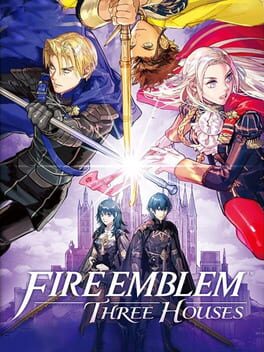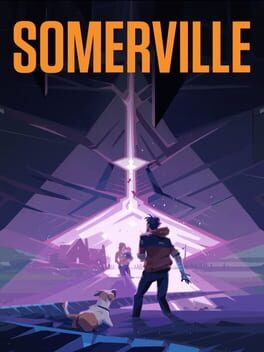MADba11
7 reviews liked by MADba11
Way too toothless an experience in my opinion, and for all it feigns interest in it's characters I was surprised how little actual effect your decisions have on them. While the game tries to argue against the harsh tribalism that defines wartime, it's mechanics betray the opposite: if somebody is on your team they will stay there no matter what you do, even if it makes no sense for their particular character. While I suppose this is meant to provide the player with the feeling of freedom , for me it had a more constrictive effect. I knew I could never make characters hate me or leave my class unless the story dictated it must occur (as it does in the Edelgard route when a very small handful of possible recruits will leave). Maybe this seems unfair but honestly, this is stuff that even a morally unimaginative company like Bioware had figured out in the late 2000's...characters should fight, even if they're on the same team, and the protagonist should actually have to make a stand and not just say whatever they know will make the support ranking go up while knowing that later they'll say the complete opposite. If you're going to make a story about the tragedy of decaying friendships, the characters actually have to have friendships that can decay in the first place.
I can't help but compare this to Genealogy of the Holy War, which of course I'm crazy for. I had characterized the writing in that game as broad but I realize now that it's actually highly efficient. The way the game presents these characters is mostly only seen through the opening cutscenes of a chapter, with the occasional vignette between units sprinkled in (if you spend a turn using the talk command on the battlefield). There is so much less dialogue compared to the hours and hours that can be found in Three Houses, and yet the characters in Genealogy were so much more vibrant to me after only a single playthrough. They felt as if they lived outside of me, that they had moments in their lives that I was not privy to. I could imagine the relationships between them in my head, imagine their downtime between battles as well as their maneuvers during combat. When characters in Genealogy of the Holy War get married, there isn't a cutscene, or even any dialogue. In fact the only thing that clues you in is that now the married units can exchange gold with each other. I felt the connection between these people even if it wasn't actively shown, and because of that the tragedy of their eventual fates hit all the harder. It's a narrative that felt spacious in a way that made me realize how constrictive so many games that present you with "moral dilemmas" actually are.
I'm rambling now so apologies, I'm not a writer. I guess the best way to sum up my feelings is that in Three Houses I felt that I was playing for the story, but in Genealogy I was just...playing the story.
I can't help but compare this to Genealogy of the Holy War, which of course I'm crazy for. I had characterized the writing in that game as broad but I realize now that it's actually highly efficient. The way the game presents these characters is mostly only seen through the opening cutscenes of a chapter, with the occasional vignette between units sprinkled in (if you spend a turn using the talk command on the battlefield). There is so much less dialogue compared to the hours and hours that can be found in Three Houses, and yet the characters in Genealogy were so much more vibrant to me after only a single playthrough. They felt as if they lived outside of me, that they had moments in their lives that I was not privy to. I could imagine the relationships between them in my head, imagine their downtime between battles as well as their maneuvers during combat. When characters in Genealogy of the Holy War get married, there isn't a cutscene, or even any dialogue. In fact the only thing that clues you in is that now the married units can exchange gold with each other. I felt the connection between these people even if it wasn't actively shown, and because of that the tragedy of their eventual fates hit all the harder. It's a narrative that felt spacious in a way that made me realize how constrictive so many games that present you with "moral dilemmas" actually are.
I'm rambling now so apologies, I'm not a writer. I guess the best way to sum up my feelings is that in Three Houses I felt that I was playing for the story, but in Genealogy I was just...playing the story.
Baldur's Gate 3
2020
i get to the final boss and shadowheart just isn't in turn-based combat. she's just like fuckn exempt. she has suddenly decided that 5e rules no longer apply, rather that schoolground rules do. time has simply frozen for shadowheart, she SEES the code. in the span of a single picosecond, she flings 40 fire bolts at the boss, the boss dies and my party are heralded as heroes. what the sword coast doesn't realise is that one of us towers over the rest with an iron fist, everywhere at once, all-encompassing, fear-mongering shadowheart
Journey
2012
It's a cool game and I get why people love this game but to me it wasn't anything special. I also only encountered AFK people so that's fun :).
Somerville
2022
This is a stylish, beautiful, cinematic and (if you look closely) interesting project in its plot. But the gameplay here is not at all catchy. Rather, it is most often perplexing. Camera selection is sometimes fiddly, puzzles are often unintuitive (although there are some interesting ideas), and action sequences can fall apart in a less-than-polished state of the game. The hero has interesting abilities, but the game seems to lack moments for their disclosure and interaction. Many game design decisions raise questions too (one of the main problems I see is that often you don’t quite understand what the game wants from you or where to go).
The slightly tediously repetitive gameplay (especially in the ending) coupled with the minimalist storytelling keeps the player from being as involved as the game seems to want it to be. It’s really a good setting and story concept, but I’m sorry that I learn about this from a guide from a person who was much more interested in exploring this world. The mechanical and technical side of Somerville unfortunately doesn't let me dig that deep. And although this is undoubtedly a visually pleasing project, its fundamental parts are not executed at a level sufficient so that they do not interfere with absorbing and laying out the plot and concept in the head. And therefore Somerville is just a beautiful sketch, but, alas, not something more.
The slightly tediously repetitive gameplay (especially in the ending) coupled with the minimalist storytelling keeps the player from being as involved as the game seems to want it to be. It’s really a good setting and story concept, but I’m sorry that I learn about this from a guide from a person who was much more interested in exploring this world. The mechanical and technical side of Somerville unfortunately doesn't let me dig that deep. And although this is undoubtedly a visually pleasing project, its fundamental parts are not executed at a level sufficient so that they do not interfere with absorbing and laying out the plot and concept in the head. And therefore Somerville is just a beautiful sketch, but, alas, not something more.
RiME
2017
This review contains spoilers
this was fuckin dumb. Every other indie game I’ve played the past like 4 years has been a somber tale about dealing with death or depression and I’m kinda over it. This one wasn’t even interesting gameplay wise though the music was great and the twist where you’re playing as the dead kid did surprise me but man I’m over this genre.
Probably about to go play another one
Probably about to go play another one
Soulsborne where I don't wanna kill my self
Def Jam: Icon
2007
This game doesn't exist.






